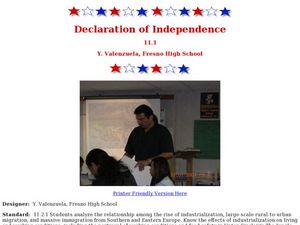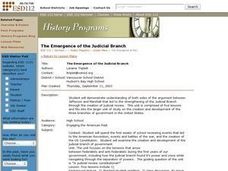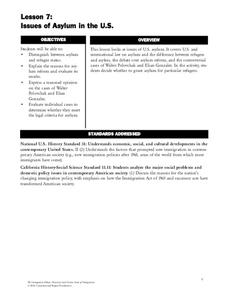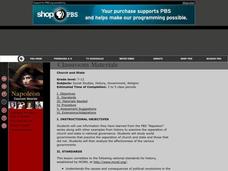Curated OER
Heart Mountain Relocation Center
Students examine several primary source documents related to the Japanese internment camp at Heart Mountain, Wyoming. They write an essay about Heart Mountain and explore the concept of restitution to Japanese-Americans.
Curated OER
Bill of Rights: Shapers of Meaning
Students review the Bill of Rights as a class. In groups, they use the internet to research the contributions made by historical figures in forming these rights. They create a poster showing the information they collected and present...
Curated OER
Civil Rights and the ADA
Students examine and discuss the 14th and 15th amentments, and evaluate the agendas of Americans from underrepresented groups in the quest for civil rights. They conduct Internet research and create essays or posters regarding Civil Rights.
Curated OER
Declaration of Independence
Twelfth graders summarize sections of the Declaration of Independence and share their interpretations with classmates. They write essays on the Declaration or an essay tracing the rights of minorities from the Revolution to the present.
Curated OER
VA Statute for Religious Freedom, II. Matching Activity
Students read and analyze primary source documents. In this matching lesson, students read sections of the Virginia Statute for Religious Freedom. Students match the document sections with paraphrased sections and discuss the accuracy of...
Curated OER
What is the (No) Establishment Clause?
Students research and discuss the Establishment Clause.
Curated OER
Comparing Rights Documents
Learners compare rights from the Universal Declaration of Human Rights with those in the United States Bill of Rights and Amendments. They explore reasons for the presence or absence of certain rights.
Curated OER
The Eiserloh Story
Students read "The Eiserloh Story" and evaluate decisions made by the government in time of war. They determine if the government violated the rights of innocent civilians. They identify the Bill of Rights and analyze each Right.
Curated OER
Dictators
Students can learn about the elements of a dictatorship through these lessons.
Curated OER
Cultural Patrimony: What Belongs to Whom?
Cultural patrimony is a fascinating topic for your students to explore.
Curated OER
Due Process of Law and the Jim Crow Era
Students analyze eight case studies of Supreme Court decisions regarding due process of law and their impact on American society in the early 20th century. They digest that although the 14th amendment was intended to give federal rights...
Curated OER
Understanding Federalist #10
Students read the Federalist #10. In groups, they discuss the meaning of each paragraph. Afterward, students write a summary exploring the important arguments of the paper. Students explore the historical significance of the document.
Curated OER
The Emergence of the Judicial Branch
Students demonstrate understanding of both sides of the argument between Jefferson and Marshall that led to the strengthening of the Judicial Branch through the creation of judicial review.
Curated OER
Understanding by Design
Fourth graders examine the origins, structures, and functions of the Colorado government. In this understanding by design lesson, 4th graders explore the three branches of government. Students identify the roles of state leaders and...
Curated OER
The Legacy of the Warren Court
Students examine the major decisions by the Supreme Court when Warren was the Chief Justice. In groups, they research the life and other works of Earl Warren and discuss how ones background can influence decisions. They also examine...
Curated OER
Popular Sovereignty Under the Kansas-Nebraska Act
Seventh graders examine the implications of the Kansas-Nebraska Act. In this slavery instructional activity, 7th graders examine a map of 1820 America and discuss the balance of power implied by the map. Students then read Stephen...
Judicial Branch of California
Separate But Equal - Is It Black or White?
The story of Ruby Bridges and the case of Brown vs. The Board of Education are fantastic tools for discussing the concept of separate but equal. Kids tackle some big questions about what is fair, what is civil, and what rights or laws...
Curated OER
Unit 2: Post-Revolution: The Critical Period 1781-1878
The post-Revolutionary Period of 1781-1787, also known as the Critical Period, is the focus of a series of lessons that prompt class members to examine primary source documents that reveal the instability of the period of the...
Constitutional Rights Foundation
Refugees from the Caribbean: Cuban and Haitian “Boat People”
Should refugees fleeing poverty be allowed the same entrance into the United States as those fleeing persecution? High schoolers read about US foreign policy in the late 20th century regarding refugees from Cuba and Haiti, and engage in...
Curated OER
Civil Rights in America
Seventh graders visit the Smithsonian and are shown different exhibits. They are to make their own drawing about one of the exhibits and write about the experience.
Tolerance
A Time for Justice
The Academy Award-winning documentary A Time for Justice launches a unit that examines America's civil rights movement. Class members examine key events and participants in the movement and consider how the civil rights movement...
Constitutional Rights Foundation
Issues of Asylum in the U.S.
Who gets to come to the United States? Examine cases of individuals seeking asylum with an informative reading passage that includes examples, statistics, and representations of public opinion regarding asylum. Groups then go on to...
Curated OER
Social Studies: Church and State
Discuss the separation of church and state as it relates to government entities. This is a great way to launch a discussion on the relationship between these groups. Learners analyze this relationship in governments throughout the world,...
Curated OER
A Presidential Portrait: Andrew Jackson
Eighth graders examine the role of intended meaning in Ralph Earl's portrait of Andrew Jackson. They, in groups, research periods in Jackson's life and use gathered information to create their own portraits of Jackson.
Other popular searches
- Constitution History Outline
- The Constitution History
- Canada Constitution History
- Us History Constitution
- U.s. History Constitution

























